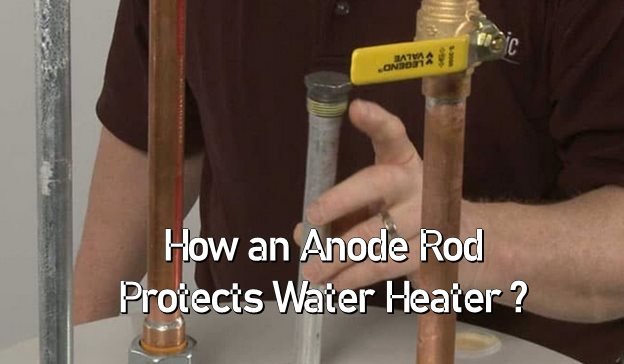Electrolysis occurs when just two parts of metal are attached inside plain water. The procedure creates the anode rod rust in the stainless steel area on your water heater.
In this procedure, the more regal (less responsive ) metal will rust more than the (more responsive ) imperial metal. Aluminum, magnesium, and zinc are much less noble than steel, meaning they’ll rust before the steel, and that’s the reason they’re used for anode rods.

What is an Anode Rod Water Heater?
The anode rod water heater is a pivotal component that significantly influences the longevity of your water heater anode. Consisting of a steel core wire encased in one of three metals—aluminum, magnesium, or zinc—the anode rod is meticulously installed into the tank.
This protective measure prevents the premature rusting and corrosion of the heater anode rods, thereby ensuring the water heater operates efficiently for a longer duration.
After the tank is full of water, the anode rod sacrifices itself to protect this water heater’s vulnerable steel via electrolysis.
Anode Rod Problems
Water heaters are usually at risk of corrosion since the composition of water and the process of how parts that sellers use to produce water heaters, for example, metal, are affected by oxygen and humidity.
The sacrificial anode condition is the most crucial part of whether a water heater lives or dies. It’s been used as a critical element for the tank’s corrosion defense for many years, although few people know it’s there.
Read also: Powered Anode For Water Heater
When the tank is filled with water, an electrochemical process starts, where sacrificial anodes are eaten to shield a small amount of exposed steel. The Powered anodes replace the process with electricity and aren’t consumed.
Several problems companies of water heaters had to handle when making water heaters in the days the past tankless water heaters incorporated:
- The level of acidity of water. Water consists of gases that typically dissolve, such as deadly carbon monoxide, generating very acidic water.
- Chemical processes. When steel has contact with moisture or oxygen, the corrosion technique will begin.
- Heat. Water heaters work at a very high temperature, and consequently, heat speeds up the decay process.
- The usage of various materials. Companies utilize many different materials in the several parts that design the water heater, and these materials produce electrical conductivity and an environment, which also increases decay.

How an Anode Rod Protects Water Heater
The use of the Anode Rod water heater ingeniously addresses the innate challenges associated with water heater operation. The rod, often made from magnesium, serves as a sacrificial element, deteriorating in place of the water heater’s more critical components like the steel tank.
This process, known as electrolysis, involves the water heater anode willingly undergoing corrosion to spare the tank, thereby markedly prolonging the unit’s overall lifespan.
Then, it delivers electrons to the tank, creating an environment that stops corrosion in the tank and its parts. Specialists call the rod the “sacrificial lamb” simply because it sacrifices itself to corrosion to protect your water heater.


